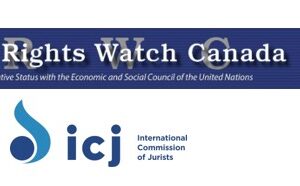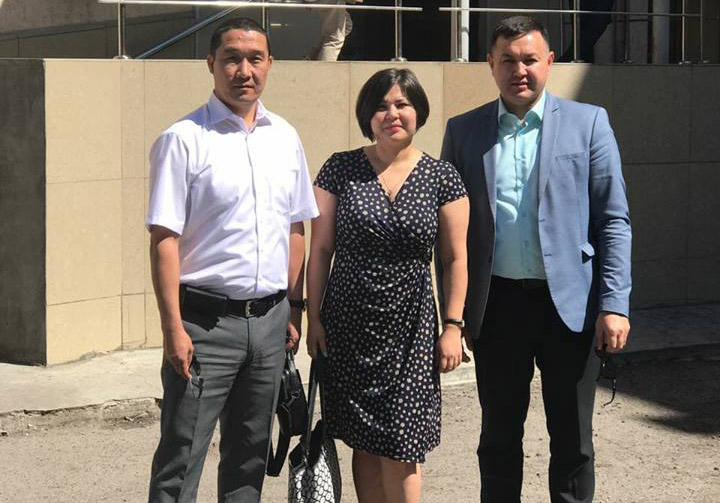
Jul 25, 2017 | Новости, Статьи
Сегодня МКЮ выразила обеспокоенность в связи с реальной угрозой уголовного преследования адвокатов Ерлана Газымжанова, Аманжола Мухамедьярова и Асель Токаевой в Казахстане.
МКЮ заявила о том, что возможность уголовного преследования адвокатов связана с осуществлением ими своей профессиональной деятельности в защиту клиентов, а не с действительным совершением ими уголовно наказуемых деяний.
МКЮ призывает компетентные власти Казахстана прекратить преследование адвокатов в нарушение международного права и стандартов, касающихся роли юристов, а также принципа законности при отправлении правосудия.
22 июня в ходе рассмотрения уголовного дела судья Убашева вынесла частные постановления в отношении адвокатов о принятии к ним мер за совершение ряда действий, которые по формальным признакам не являются уголовно наказуемыми деяниями. К ним относится обращение с жалобой на неэтичное поведение судьи в Комиссию по судейской этике и Судебное Жюри Верховного суда Республики Казахстан, заявление ходатайства об отводе судьи, заявление о том, что преступление было совершено другим подзащитным, а также участие в международной конференции вместо явки в судебное заседание для защиты своих доверителей.
Закон не запрещает использовать различные процессуальные механизмы, к которым прибегли адвокаты, включая жалобу на действия судьи и ходатайство о ее отводе. Напротив, такие действия, как заявление ходатайств об отводе, обращение с жалобами на неэтичное поведение в соответствии с официально установленными процедурами, а также осуществление стандартных функций защиты в рамках уголовного процесса являются обычными процессуальными мерами, предусмотренными законодательством Казахстана. Кроме того, они имеют основополагающее значение для целей отправления правосудия в соответствии с принципом законности.
В частных постановлениях суда отсутствует анализ статей, предположительно нарушенных адвокатами. Судья обвинила некоторых адвокатов в «демонстрации превосходства над другими участниками процесса». Кроме того, по мнению суда, один из адвокатов разместил на «фэйсбуке» не соответствующие действительности сведения о процессе, в котором он участвовал. При этом в частном постановлении не приводятся факты, которые бы описывали конкретные действия адвокатов, позволившие судье прийти к данным выводам.
Обвинение двух адвокатов в том, что они приняли участие в международной конференции вместо того, чтобы явиться в судебное заседание, в крайнем случае может подпадать под действие дисциплинарных норм, регулирующих поведение адвокатов, но не уголовного закона. МКЮ отмечает, что данное обвинение, как правило, следует адресовать дисциплинарному органу – Коллегии адвокатов, а не Министерству юстиции.
Наряду с возбуждением уголовного расследования в отношении адвокатов судья Убашева поставила перед Министром юстиции вопрос о привлечении адвокатов к установленной законом ответственности за нарушение норм профессионального поведения, необоснованного затягивания уголовного дела в суде и проявления неуважения к суду, и перед Министерством внутренних дел – о проведении проверки на предмет наличия в действиях адвокатов признаков правонарушения по статье 407 Уголовного кодекса Республики Казахстан – воспрепятствование правосудию.
20-21 июля 2017 года Судебная апелляционная коллегия по уголовным делам рассмотрела апелляционные жалобы на приговор суда и частные жалобы адвокатов в отношении частных постановлений суда.
Гулнора Ишанханова, комиссар МКЮ, присутствовала на слушании дела в Суде города Астаны в качестве наблюдателя МКЮ.
Kazhakstan-Trial observation 3 lawyers-News-web story-2017-RUS (полный текст на русском, PDF)
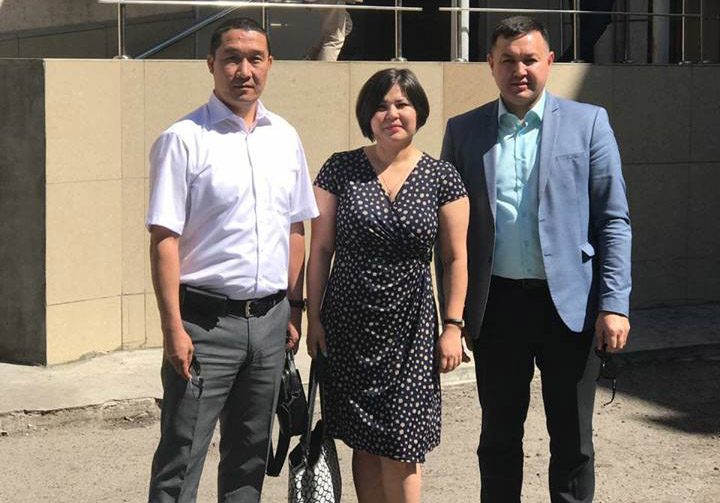
Jul 25, 2017 | News
Today the ICJ expressed concern about the real threat of criminal prosecution against lawyers Yerlan Gazimzhanov, Amanzhol Mukhamedyarov and Assel Tokayeva (photo) in Kazakhstan.
The ICJ said the action against lawyers was aimed at their discharging of their professional functions on behalf of clients, and not for any genuine criminal misconduct.
The ICJ called on the responsible authorities of Kazakhstan to discontinue the proceedings against the lawyers, which are contrary to international law and standards on the role of lawyers and the rule of law in the administration of justice.
On 22 June, in a court hearing in the criminal case, judge Ubasheva issued interim rulings against the lawyers seeking their prosecution for a number of acts, which on their face do not consist of criminal misconduct. The conduct for which prosecution is sought includes lodging a complaint alleging unethical conduct by the judge with the Commission on Judicial Ethics and Judicial Jury of the Supreme Court of the Republic; filing a motion for recusal of the judge; stating that the crime for which their clients had been accused had in fact been committed by another defendant; and participating in an international conference, rather than attending a court hearing to defend clients.
The various legal procedures used by the lawyers, including their complaint against the judge and the request for the judge’s recusal, are not prohibited by law. On the contrary, acts such as filing motions for recusal, lodging ethics complaints through officially prescribed channels, and performing standard criminal defence functions they constitute regular procedures prescribed in legislation Kazakhstan. They are also fundamental pursuant to the proper administration of justice under the rule of law.
The interim rulings of the court did not provide an analysis of the legal provisions allegedly violated by the lawyers. Certain of the lawyers were said by the court to have “demonstrated superiority over other actors in criminal proceedings.” It was also alleged that the information posted on a Facebook page about the proceedings in which one of the lawyers took part was false. However, the ruling failed to cite any specific details or conduct of the lawyers which would support these conclusions.
Regarding the charge that two of the lawyers had chosen to participate in an international conference rather than appear at the court hearing, this at most would fall under disciplinary procedures governing the conduct of members of the bar, and not the criminal law. The ICJ notes these charges should normally be made to competent disciplinary body, the Collegium of Lawyers, and not the Ministry of Justice through the request of the judge.
In addition to the criminal prosecution, judge Ubasheva asked the Ministry of Justice to take measures against the lawyers for a breach of professional ethics, causing unjustified delays in criminal trial, and contempt of court, and asked the Ministry of Interior to undertake an inquiry to determine whether the conduct of the lawyers constituted an offence punishable under Article 407 of the Criminal Code of Kazakhstan (obstruction of justice).
On 20-21 July 2017, the Criminal Chamber of Appeals examined the lawyers’ appeals against the conviction and interim appeals against the interim rulings.
The appeal proceedings before the Astana City Court were attended by Gulnora Ishankhanova, ICJ Commissioner acting as an ICJ observer.
Kazhakstan-Trial observation 3 lawyers-News-web story-2017-RUS (story in Russian, PDF)
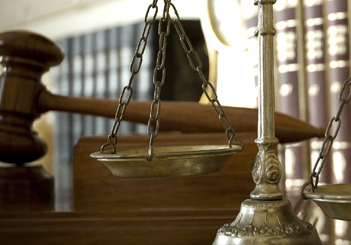
Jul 25, 2017 | News
The ICJ is concerned with the passing of Constitutional Amendment no. 1 of 2017 by the House of Assembly of Zimbabwe on 25 July 2017.
The House of Assembly voted with over two-thirds majority for the amendment of the Zimbabwean Constitution.
The amendment grants the President the right to appoint to office, the Judge President of the High Court, the Deputy Chief Justice and the Chief Justice of Zimbabwe.
Before this amendment the Judicial Services Commission (JSC) spearheaded the process of selection and appointment of judges with the President merely appointing from candidates recommended to him by the JSC.
The enactment of this Bill to law is likely to have a negative effect on the public’s perception of the judiciary. It also has the potential to affect the impartiality and the independence of the judiciary.
“The amendment to the 2013 Constitution will negatively affect public confidence in the judiciary. Not only is this a departure from a position that was in line with international standards and best practices; the amendment is likely to have a ripple effect on the judiciary,” said Arnold Tsunga, the ICJ Africa Director.
“In the short term the executive now has a carrot, which it can dangle in front of judicial officers. If a judge wants to be promoted to Judge President, Deputy Chief Justice or Chief they may have to align themselves with the thinking of the executive. Over time, given the central roles that these three office bearers play in the appointment process and thought leadership, Zimbabwe is likely to have a very executive minded bench,” he added.
To this end the ICJ calls upon the government of Zimbabwe to reconsider its decision to amend the Constitution in the manner proposed in the bill.
The procedure in section 180 of the constitution had distinguished Zimbabwe’s appointment procedures as exemplary in the region.
It is unfortunate that through this amendment the country has failed to consolidate this leadership position.
The amendment would be regressive and poses a real risk of undermining the essential role of the judiciary in securing the rule of law in Zimbabwe.
Zimbabwe-Constitutional Amendment-News-web stories-2017-ENG (full statement, in PDF)
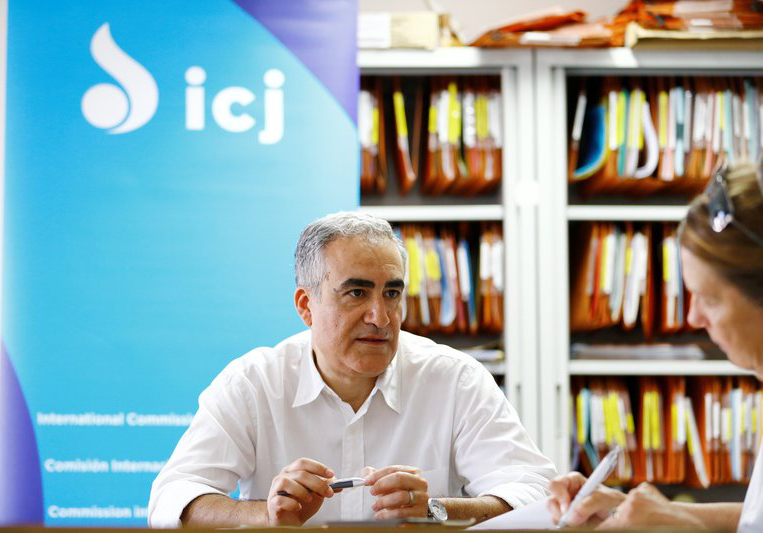
Jul 20, 2017 | Artículos, Noticias
Una entrevista del Secretario General de la CIJ Sam Zarifi con la periodista de Reuters Stephanie Nebehay.
El presidente estadounidense Donald Trump es parte de una nueva estirpe de líderes en el mundo que, como el venezolano Nicolás Maduro, quieren utilizar su mandato democrático para socavar el estado de derecho, dijo el miércoles el jefe de una ONG de derechos humanos y asuntos jurídicos.
Saman Zia-Zarifi, secretario general de la Comisión Internacional de Juristas (ICJ por sus siglas en inglés), que tiene su sede en Ginebra, llama a Trump un “populista autoritario” y lo compara a los líderes de países como Venezuela, Turquía, Filipinas o Hungría.
Zarifi, que nació en Irán y se mudó a Estados Unidos cuando era adolescente, citó como ejemplo la restricción a los viajes impuesta por el gobierno de Trump a los ciudadanos de seis países de mayoría musulmana.
“Lo que es diferente ahora es que se usa un cierto tipo de populismo para contrarrestar la noción del estado de derecho”, dijo Zarifi en una entrevista en la sede de la ICJ, que está conformada por 60 jueces y abogados destacados del mundo que buscan proteger los derechos humanos y el imperio de la ley.
“El nuevo populismo tiene un cierto descaro que es nuevo. No es que están negando que están violando derechos, lo que dicen es que pueden violar derechos porque de alguna manera están empoderados por el pueblo”, señaló.
Zarifi, que encabeza la ICJ desde abril, dijo que esta nueva generación de populistas incluye a Nicolás Maduro de Venezuela, Tayyip Erdogan de Turquía y Rodrigo Duterte de Filipinas; al primer ministro Viktor Orban de Hungría y al líder del partido oficialista de Polonia, Jaroslaw Kaczynski.
“Yo diría que en Estados Unidos Trump es un populista autoritario. Tiene tendencias autoritarias pero aún hay mecanismos de control y equilibrio”, estimó Zarifi. “Así es que no es una figura totalmente autoritaria”.
La Corte Suprema revisó partes del decreto del gobierno de Trump que establecía restricciones al ingreso de viajeros de Irán, Libia, Somalia, Sudán, Siria y Yemen, una normativa que según Trump busca combatir el terrorismo.
La decisión del tribunal, de acuerdo a Zarifi, pondría a prueba “la salud del sistema de equilibrios” de los poderes en Estados Unidos.
En Venezuela, Maduro busca establecer una Asamblea Constituyente con autoridad para reformar a Constitución y cerrar el Congreso dominado por la oposición, con una votación prevista para el 30 de julio.
Foto: Reuters / Pierre Albouy
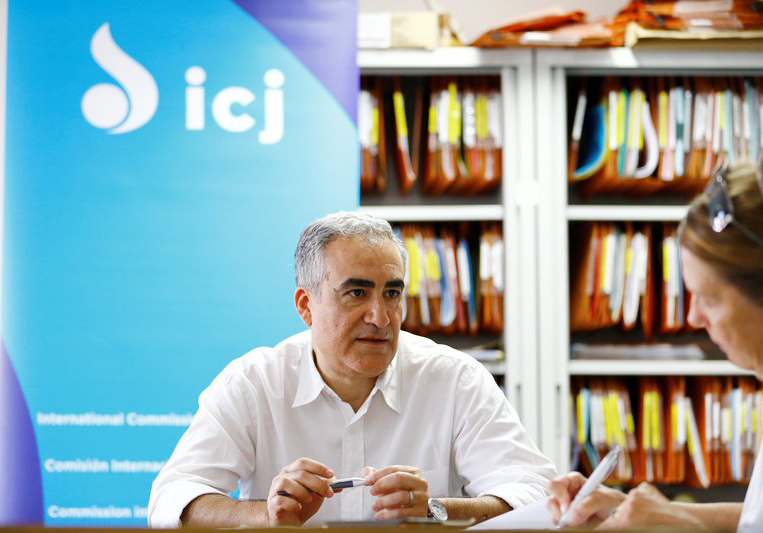
Jul 20, 2017 | News
An interview of ICJ Secretary General Sam Zarifi with Reuters journalist Stephanie Nebehay.
GENEVA (Reuters) – Donald Trump is one of a new breed of leaders around the world who seek to use their democratic mandate to undermine the rule of law, the head of a legal and human rights watchdog said on Wednesday.
Branding the U.S. president an “authoritarian populist”, Saman Zia-Zarifi, secretary-general of the Geneva-based International Commission of Jurists (ICJ), compared him to the leaders of Turkey, the Philippines, Hungary and Venezuela.
Zarifi cited as an example Trump’s travel ban on nationals from six Muslim-majority countries, a policy that he called “highly problematic” under the U.S. constitution and international law.
“What is different now is that a certain kind of populism is being used to actually counter the notion of the rule of law,” Zarifi said in an interview at the headquarters of the ICJ, which is composed of 60 eminent judges and lawyers from all regions who seek to protect human rights and the rule of law.
“The new populism has a certain shamelessness about it that is new. It’s not that people are denying that they are violating rights, what they are saying is they can violate rights because somehow they are empowered by the people,” he said.
Zarifi, who took over at the ICJ in April, said the new breed of populists included Turkey’s President Tayyip Erdogan, Venezuela’s Nicolas Maduro, the Philippines’ Rodrigo Duterte, Hungary’s Prime Minister Viktor Orban and Jaroslaw Kaczynski, head of Poland’s ruling party.
“I would say that in the U.S., Trump is an authoritarian populist. He has authoritarian tendencies but he still is facing checks and balances,” Zarifi said. “So he is not a full-blown authoritarian figure.”
The U.S. Supreme Court revised parts of Trump’s executive order banning travellers from Iran, Libya, Somalia, Sudan, Syria and Yemen, a policy Trump says is aimed at tackling terrorism.
“Looking at it again from the point of view of U.S. law – I’m an American lawyer – it seems highly problematic,” said the Iranian-born Zarifi, who moved to the United States as a teenager and holds a law degree from Cornell University.
Supreme Court rulings would be, he said, “a test for the health of the system of checks and balances in the U.S.”
Turkish Judiciary “Politically Compromised”
A crackdown by Erdogan’s government has led to the arrest of 50,000 people and the suspension of 150,000 in the year since a failed military coup in Turkey where the judiciary is “now politically compromised”, Zarifi said.
The Turkish government has said the action is justified by the gravity of the threat to the state from the coup attempt.
On Monday, the state prosecutor asked a court to remand the local Amnesty International director and nine other activists in custody pending trial for membership of a terrorist organisation.
Erdogan was quoted by Turkish media this month as saying they were detained on the basis of intelligence and that the judiciary would make its own decision.
But Zarifi said the judiciary should have thrown the case out.
“The handling of the case highlights the very serious concerns – and alarm in fact at this point – that we have raised about the independence of the judiciary and the legal system in Turkey over the last few years.”
Photo Credit: Reuters / Pierre Albouy








